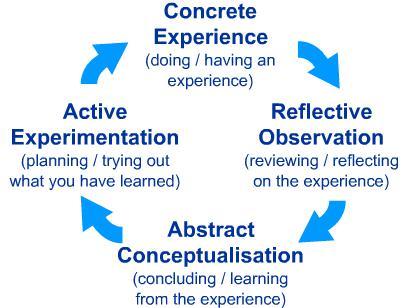
I want to talk about learning. But not the lifeless, sterile, futile, quickly forgotten stuff that is crammed in to the mind of the poor helpless individual tied into his seat by ironclad bonds of conformity! I am talking about LEARNING - the insatiable curiosity that drives the adolescent boy to absorb everything he can see or hear or read about gasoline engines in order to improve the efficiency and speed of his ‘cruiser’. I am talking about the student who says, “I am discovering, drawing in from the outside, and making that which is drawn in a real part of me.” I am talking about any learning in which the experience of the learner progresses along this line: “No, no, that’s not what I want”; “Wait! This is closer to what I am interested in, what I need”; “Ah, here it is! Now I’m grasping and comprehending what I need and what I want to know!”
Carl Rogers 1983: 18-19
All learning is social, at some minute point or in some way, but the fact of the matter is that human beings are social creatures.
Learning cannot, and does not happen in a vacuum – without some aspect of social interaction in some shape or form.
Sometimes things don’t fully add up in the way that learning is designed – some e-learning courses, for example can effectively isolate learners from the very phenomena that facilitates learning – social interaction.
What I’d like to do is to look at some of the theories in learning and look at how learning can be streamlined and designed to reflect the way that learning ‘happens’ - if you would like to read further, do have a look at my post on this blog “How not to learn a foreign language”.
Of course we could make a distinction between ‘Pedagogy’ – the way that children learn and ‘Androgogy’ – the way that adults learn, but there are, perhaps grounds for merging the two terms and sticking with one – ‘Pedagogy’, at least for this short post.
So let’s take a look at some of the major learning theories concerned with learning – we will not be able to include all here though.
Lev Vytgotsky argues that culture is the prime determinant in human development within his ‘Social Cognition’ learning model, where people develop in the context of their culture, getting the greater part of the content of their thinking (knowledge) and the tools of intellectual adaptation – basically, in short, culture teaching us What to think and How to think it.
Learning occurs through a dialectical process whereby people learn through collaborative problem solving – language, in terms of the mother tongue, being an excellent example of a primary form of interaction that imparts a rich body of knowledge that pre-exists within the culture to the ‘learner’.
‘Internalisation’ is what Vytgotsky terms as a way of using language internally to direct and modify behaviour, by the learner.
As the learner becomes more accomplished, the language serves as a primary tool of intellectual adaptation – using the language as a means for learning.
If we think of the learner as a child, Vytgotsky suggests that there are things that a child can do alone and those that they need help with, he calls this, ‘The Zone of Proximal Development”.
Interaction with people around them and with the culture that surrounds them greatly contribute to the learner’s development.Gagne, in his “Conditions of Learning” theory, suggested that learning, involving cognitive strategies, require opportunities to practice and develop strategies to solve problems and to learn attitudes that help with the learning process.
Bruner’s “Constructivist” theory of learning, is based on cognition, which states that learning is an active process where learners construct ideas and concepts based upon their own past knowledge.
The theory also suggests that no person ever goes into any situation where they have absolutely no past experience, whether it be first hand or anecdotal.
A lot of Bruner’s theory promotes “guessing”, although he calls it “making hypotheses” in order to facilitate decision making whilst discovering principles during learning experiences.
Bandura’s “Social Learning” theory emphasizes the importance of observation and modeling of behaviors, attitudes and reactions triggered by emotions to others – which by definition means that learning must occur in a social context.
Kolb proposed a four-stage learning process with a model that is often referred to in describing experiential learning (McGill & Beaty 1995).

The process can begin at any of the stages and is continuous, ie there is no limit to the number of cycles you can make in a learning situation. Kolb’s theory asserts that without reflection we would simply continue to repeat our mistakes.
The experiential learning cycle is very similar to the cycle used in Total Quality Management (TQM) called P.D.C.A. (Plan, Do, Check, Act)Most theorists suggest that all learning, or any learning for that fact (nuance) results in change – we can therefore measure if learning has been achieved by observing changes in behavior.
This somehow falls short of the mark as far as learning is concerned, although it probably provides some explanation which can be easily digested – especially as this precept has been the bread-and-butter for many educators for many years.
However, as good as this may be in a setting where something is “produced” it does tend to discount times where, although learning clearly occurs, there are no observable signs of change.
Learning may indeed occur, although the extent to which experience was used is unclear, but probably undebatable – although this can, no doubt, more accurately be described as conditioning.
Not surprisingly, many theorists have, since, been less concerned with overt behavior but with changes in the ways in which people ‘understand, or experience, or conceptualize the world around them’ (Ramsden 1992: 4).
The focus for them, is on gaining knowledge or ability through the use of experience.There could also be a strong case for a change in attitudes to learning, which would represent the change aspect in learning – which can clearly be seen within the scope of Learning to Learn.
‘knowing’ and ‘knowing how’
A man knowing little or nothing of medical science could not be a good surgeon, but excellence at surgery is not the same thing as knowledge of medical science; not is it a simple product of it.
The surgeon must indeed have learned from instruction, or by his own inductions and observations, a great number of truths; but he must also have learned by practice a great number of aptitudes. (Ryle 1949: 48-49)
Learning how or improving an ability is not like learning that or acquiring information.
Truths can be imparted, procedures can only be inculcated, and while inculcation is a gradual process, imparting is relatively sudden. It makes sense to ask at what moment someone became apprised of a truth, but not to ask at what moment someone acquired a skill. (Ryle 1949: 58)
If we accept that the results of learning are to serve a social purpose, as far as interactions in business, work and everyday life are concerned, then the maxim that ‘no man is an island’ can be more easily appreciated as having at least some grounds here, especially with reference to the growing amount of social media tools that are speeding up the potential of reaction, and thus learning in a social setting to lightning speed.
The truth of the matter is that we are all learning and educating in our daily lives – there is no point being the best engineer in the company unless you can communicate what you are doing to others, which entails a certain degree of social interaction to impart information, which could roughly be described as ‘educating’ or at worst ‘informing’ in terms of imparting information.
Social interaction is where we learn about ourselves, others and the world around us – take this away and it becomes similar to the tree that falls in the forest; how can we prove that it has indeed fallen, or more to the point, how can we tell if learning has indeed happened?
The end result of all that we do in any day will always result in some kind of learning occurring, which by definition entails some element of social interaction, whether that includes any noticeable or discrete change – well the jury is still out on that one.
What are your thoughts on this?
Active Consultants promote social learning by the integration of social learning & Blended Learning tools in businesses in France and throughout the world
© 2011, ©Active Consultants 2011. All rights reserved. Copying in part or in entirety only permitted by written consent

Original content here is published under these license terms: X
License Type:Commercial
License Summary:You may read the original content in the context in which it is published (at this web address). You may make other uses of the content only with the written permission of the author on payment of a fee.
Republished by Blog Post Promoter

